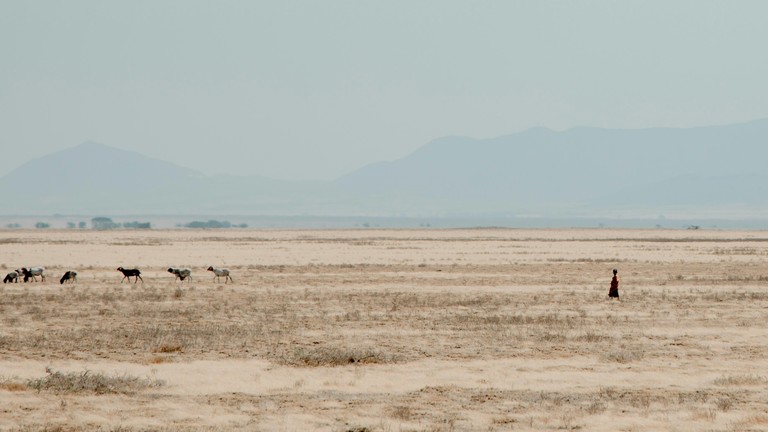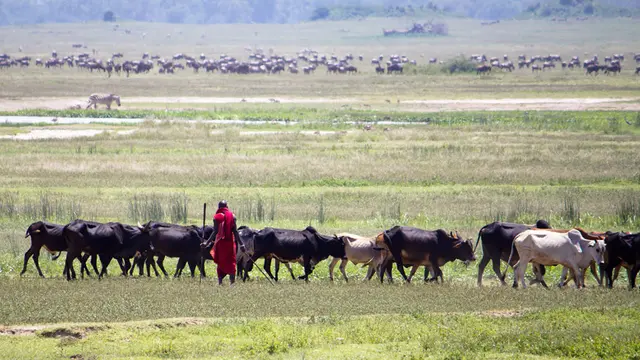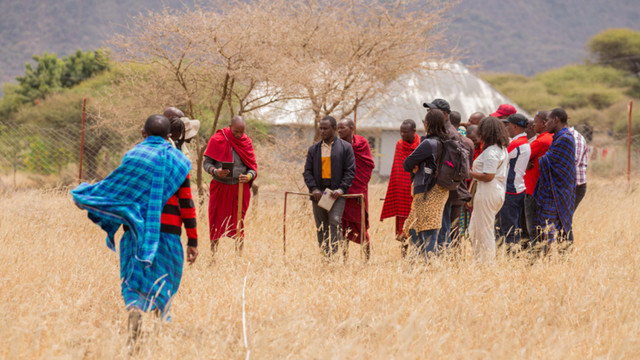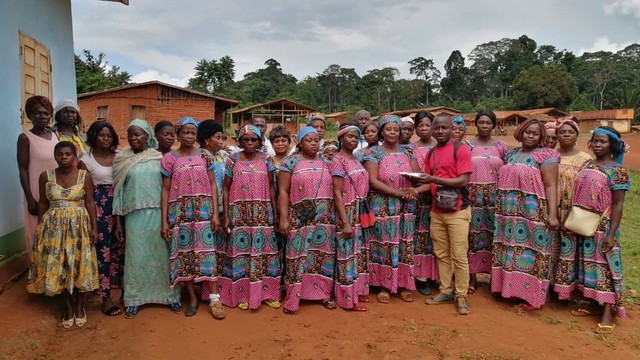CBA18: local solutions inspiring global action
CBA18 brings together practitioners, grassroots representatives, local and national government planners, policymakers and donors working at all levels and scales to discuss how we can drive ambition for a climate-resilient future.

A herder in the Serengeti National Park, Tanzania (Photo: Clement Mabula via Unsplash)

The 18th International Conference on Community-Based Adaptation to Climate Change (CBA18) takes place from 6 May to 9 May 2024 in Arusha, Tanzania. Registration is now closed with all places sold out.
The CBA conference series aims to bring together a community of practitioners who are collectively seeking to reimagine solutions that enable transformative outcomes, through the agency of communities driving climate action.
CBA is a space for the adaptation community to share learning on community-based and locally led adaptation systems, and to explore how to put the principles for locally led adaptation (LLA) into practice, recognising the complexities, innovations and challenges that must be overcome.
With a focus on acquiring new skills, sharing experiences and connecting with peers, the conference offers participants four days of discussion, debate, peer-to-peer ‘skill-shares’ and knowledge exchange, through an innovative, dynamic and interactive space, enabling participants to promote climate action.
The CBA18 agenda
For the last few years the CBA conference agenda was built around a fixed set of up to five themes. CBA18 has evolved its thematic structure, informed by participant feedback and our first call for submissions. Climate finance, policy and planning, nature-based solutions, youth, innovation and many more all feature but the agenda does not pre-determine specific themes.
This year we are inviting participants to think critically and creatively on how to ‘decolonise climate action’ and promote ‘locally-led innovation and adaptation’. We believe these are important intersecting issues for community-based adaptation and locally led adaptation to climate change. In this light, sessions will link our community’s work and interests with one or both of decolonisation and locally-led innovation.
Watch this space as we’ll be updating and adding sessions in the lead up to the conference.
How do we connect these ideas to the CBA18 agenda?
The sessions at CBA18 are each framed around a question posed by session hosts that participants try to address. Below are some examples of session questions that capture the breadth of topics we hope to delve into, that relate to over 90 responses to the first call for submissions and make a link to one or both of decolonisation and locally-led innovation.
These are examples – they are not intended to be fixed, or limiting, but aim to inspire and guide you in developing your own questions around your own themes when planning to join us at CBA18.
There are many ways to get involved in the agenda! See further details below and sign up to be the first to find out when calls for submissions are open.
Delving deeper into the conference themes, the workshops are facilitated to encourage dialogue, debate and interaction around an urgent question, and avoid unidirectional presentations and panels (in particular, all-white, male 'manels').
All thematic workshops are co-hosted by at least two organisations. Expect creative and innovative formats and tools that help participants understand the perspectives of others, seek practical solutions and consider different scenarios.
Skill-shares match delegates with specific skills with those seeking to acquire or strengthen their competence and knowledge. These skill-shares take place in an informal setting and we encourage participants to consider and recognise that their on-the-ground experience is valuable and of interest to others – regardless of being 'trainers' themselves.
Like the rest of the agenda, skill-shares are crowd-sourced and can cover any topic relating to climate adaptation. Past years have included training on topics as varied as ‘how to write better blogs’, accessing climate finance, delivering participatory monitoring, evaluation and learning and writing funding proposals.
Our focus is on sharing: these sessions see practitioners sharing the practical tools and approaches they have been using to generate effective action. Our skill-shares let participants contribute their experiences and discuss what they have learned with their peers – people in similar contexts working on similar issues across the world.
At the CBA Marketplace participants become 'stall holders', sharing tools or approaches they have developed as well as lessons and insights from their experience (failures and successes), and set out good-practice narratives that showcase creativity and lived experience.
Short films are a powerful way of showing the nuances of an issue, the personal experiences of climate change or the lessons emerging from a project. CBA17 showcased a series of short videos and films that highlighted issues relevant to community-based adaptation – participants were then asked to vote for their favourite.
Short films will be shown in a special session during the CBA18 conference.
Open Space sessions can be structured and designed in advance or be an impromptu roundtable-style open discussion. They exist to ensure space for spontaneous discussions that occur at the last minute and all they need is a person willing to lead the discussion.
Discuss burning issues that haven’t been addressed elsewhere, highlight big ideas to develop with others or convene those working on a particular issue or in a geographical region.
The CBA open space endorses the “law of two feet”: if the conversation is not working for you, you are free to move on to another session!
After a seven-year hiatus, we’re delighted to announce that our much-loved field trips are back!
These field visits are optional and separate to the four-day conference. They are limited in size on a first-come, first-served basis and involve an extra cost. They’ve been a most cherished part of CBA conferences for its first 11 years. Our in-country host, Tanzania People & Wildlife, will take participants to visit communities and projects championing locally-led action.
What makes the CBA conference different?
Okoth Opondo, Campde VoicesThis conference was uniquely different, because the people on the panel were not people with very well-polished English and the politically correct people who would like to be very diplomatic with their talks. They were speaking as farmers on the ground as people working around agriculture, people in the mines, who were just saying the truth, as things are supposed to be… even from their clothing, you could tell these were people who were really from the community, who had been brought there to share their experiences, and that to me, was really inspirational
It's the only global conference focused on practitioners
CBA prioritises lived experience, such as evidence and perspectives of those working directly to deliver community-based climate adaptation: communities, researchers and local and national government representatives. Practitioners make the programme, working together to articulate their knowledge, learning and experiences.
The conference fosters a safe environment, creating open space for sharing experiences, perspectives and uncomfortable discussions across disciplines, knowledge bases and local contexts. It prioritises listening to and learning with participants living and working at the frontline of climate change impacts and adaptation action over 'experts' and 'senior officials'. Everyone is encouraged to play an active role in the design and delivery of sessions, not just to attend.
A local NGO leader told us: “[the] CBA platform helps us validate our issues and to share our thoughts [and] the way we are working, to get the confidence and inspiration. We didn’t know before [the conference] that [the way we work] is unique and meaningful.”
CBA creates spaces where local knowledge and lived experience is sought after and valued, through which participants gain confidence and strengthen their capacity.
It creates evidence that informs action
Participants from donors and large adaptation programmes to local NGOs come to CBA to find out directly from the practitioners what works and what doesn’t.
Vincent Gainey, climate resilience advisor in the Energy, Climate and Environment Directorate of the UK’s Foreign, Commonwealth, and Development Office (FCDO) began attending CBA “to learn about the groundswell from CBA [and to] learn from CBOs”. He noted that attending CBA14, 15 and 16 helped him to formulate the arguments to convince the FCDO minister to endorse the LLA principles, the first government to do so. The UK has been funding the LDC Initiative for Effective Adaptation and Resilience (LIFE-AR) since 2020 and made LLA a key component of the UK COP26 presidency in 2021.
At CBA13 Euster Kibona, from Tanzania Forum CC, learned from a participant in Zimbabwe how to work with men in communities to open space for women to participate in adaptation activities. Forum CC then worked with municipal staff in a project to produce energy pellets from market waste. Working with the municipality mitigated the cultural issues and staff were able to work with both men and women.
It puts community at the centre
CBA is the only adaptation conference that puts the lived experiences and knowledge of local people at the centre. It creates a space that enables the most vulnerable communities to discuss their priorities for adaptation at local level, as well as to share their approaches and shape decisions about the future of adaptation.
The conference is a space to explore the importance and urgency of locally led adaptation and other burning issues. CBA ensures that the perspectives of people on the frontline of climate impacts are heard at the highest levels through knowledge sharing, capturing key messages from the conference sessions and influencing global processes.
Participation, networking and interaction like no other
CBA provides an opportunity to build South-South networks, strengthen relationships and connect with like-minded practitioners and experts. Interactive sessions, skill-shares, dedicated meeting and networking space and a collegiate atmosphere brings participants together on an equal footing, regardless of background or formal level of education. Participants find a sense of togetherness, with a wealth of knowledge and networks to support their efforts.
Jenninah KabiswaThis was the first in-person CBA I was attending. I came to support the skill-shares and thought I was coming to "give ". I received so much learning, made some important connections and even developed a business proposal in just one afternoon! What an amazing conference it has been.
Your voice expands and grows beyond the conference
CBA conferences are attended by delegates from a wide range of institutions from outside our community of practice, such as the UNFCCC, Least Developed Countries (LDC) Group, climate finance funders and LDC government ministries, who take our messages with them.
Representatives from global initiatives that are shaping adaptation policy and practice on an international level join CBA conferences to understand practitioner perspectives more deeply; the conference has been a catalyst for initiatives such as LIFE-AR’s 2050 vision and the LLA principles, endorsed by over 100 governments.
CBA’s outreach spans continents and scales with messages taken to high-level platforms and global summits including the UN Secretary-General's Summit, the biodiversity and climate COPs and many others – driving real grassroots-led change.
Success stories captured in the recent CBA evaluation report range from grassroots-led agricultural centres in Kenya to Catalytic Grant Awards that connected participants across the globe, illustrating the tangible outcomes and collaborative spirit fostered by the CBA conferences.
Registration
In order to cover the costs and offer sponsorships to local practitioners from across the world CBA is a ticketed event.
Due to the overwhelming demand for tickets this event is now sold out and registration is closed.
Subsidised places
Due to the overwhelming demand for tickets all subsidised places have been filled and registration is now closed.
Contact and updates
If you have any questions about the conference or about registration, please email cbaconference@iied.org.
Sign up to receive updates on CBA and the latest news on CBA18.
About the organisers
CBA18 is co-hosted by Tanzania People & Wildlife and is recognised by and receives the support of the government of Tanzania.
It is organised and funded by the Adaptation Research Alliance, the Bill & Melinda Gates Foundation, CARE, the Climate Justice Resilience Fund, the International Institute for Environment and Development, the Global Resilience Partnership, the Green Africa Youth Organisation, Ministry of Foreign Affairs of the Netherlands and Practical Action, in collaboration with ACTADE, Africa Youth Initiative on Climate Change, International Institute for Sustainable Development, the National Adaptation Plan Global Network, Tebtebba Indigenous Peoples' International Centre for Policy Research and Education, The Global Fund and VSO.
If you’d like to become a CBA partner, please get in touch with Teresa Sarroca via teresa.sarroca@iied.org.

















